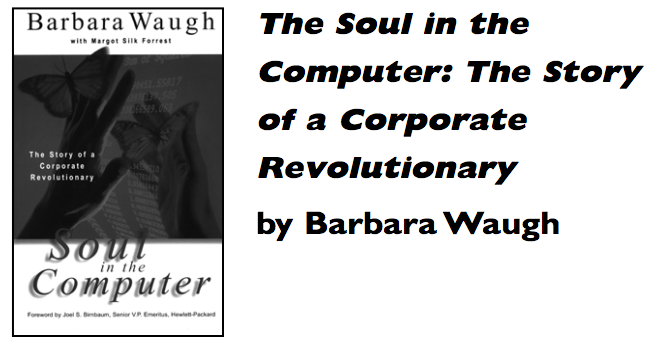
Eighteen years ago, Barbara Waugh changed her tactics for fulfilling her lifelong dream of creating a better world. The feminist theologian, radical activist, psychologist, and news columnist departed the nonprofit sector to promote transformation from inside corporate America. Hired by Hewlett-Packard as a staffing manager, Waugh was soon propelled to the forefront of HP’s worldwide change initiatives. Her memoir, The Soul in the Computer: The Story of a Corporate Revolutionary (Inner Ocean, 2001, written with Margot Silk Forrest), documents her efforts to encourage the ingenuity and altruism of employees and to help HP more clearly define itself as a global corporate citizen.
Interweaving her personal story and professional experiences, Waugh describes the evolution of her role at HP Labs, the company’s central research facility. Appointed worldwide change manager in 1993, she began to find ways to spotlight areas that embodied the change HP was trying to create. Through their commitment, she and her staff deeply transformed the computer giant’s corporate culture.
An Ecosystem of Tools
Key to Barbara’s success was treating the corporation as a living system, that is, allowing “each part of the organization its own intelligence and priorities in the service of the good of the whole.” To do so, she continually invoked an “ecosystem” of radical stands, moves, and tools.
Radical Stands: Put a Stake in the Ground. This approach demands a commitment to change no matter what or how long it takes. It requires a long-term perspective, an appreciation of our efforts and others’ support, and an ability to cope with obstacles.
One of Barbara’s “stakes” involved helping the senior vice president of R&D figure out how to make HP Labs the world’s best industrial research lab. Her idea to include “vision questions” in the annual employee survey elicited a flood of responses. Waugh then arranged for a group of engineers to read pieces culled from the feedback in front of 30 senior managers. The “performance” shed light on the whole system and inspired the executives to create the only HP management plan that cascaded both up and down the organization.
Radical Moves: Recruit Co-conspirators. Barbara attributes everything that she has accomplished at HP to the advice, help, and resources of others. Some of her best ideas came from starting conversations and listening to others. She considers her most important tactical tool “amplifying positive deviance,” that is, highlighting those people in the organization who are already successful at producing change.
She also stresses aggregating likeminded people until they become a significant force for change. For instance, a decade ago, Waugh supported HP’s burgeoning Technical Women’s Conference, designed to help women professionals find their voices in HP’s majority male culture. Since then, HP women have become “a voice, a presence, and equal partners with male colleagues for success and change.” Waugh thinks it’s no coincidence that in 1999 HP became the only Fortune 200 company with a female CEO.
Radical Tools: Turn “Enemies” into Allies. One way Waugh overcomes roadblocks is by finding things to appreciate about people with different opinions. She also shifts the context of what she is doing. When budget cuts squelched a sustainability conference she was running, Barbara and her staff reframed it as an opportunity to learn how customers supported sustainable development. She also embraces the concept “tweak, don’t toss.” For instance, a simple shift in HP Labs’ vision from being the best in the world to the best for the world suddenly got everyone in the company excited about change.
A Shining Soul
In 1999, when CEO Carly Fiorina presented HP as “the winning e-company with a shining soul,” Waugh took HP Labs’ vision to a new level. By cultivating a relationship with a revolutionary business leader in Bangladesh, she and some colleagues shaped an idea for HP to deliver the benefits of the Internet to the world’s poorest people. How? Through innovative partnerships that would create self-sustaining, profit-making businesses. This project soon spun into a new HP business now called “eInclusion Solutions.” As of her book’s printing, Waugh’s role as cofounder includes scouting business opportunities, constructing a business plan, and assembling a team knowledgeable in developing-market issues.
The Soul in the Computer immerses the reader in the web of change as Waugh lived it. Her compassion, honest self-examination, eclectic background, and firm commitment to responsible globalization make this book a delight to read.
Kali Saposnick is publications editor at Pegasus Communications.
